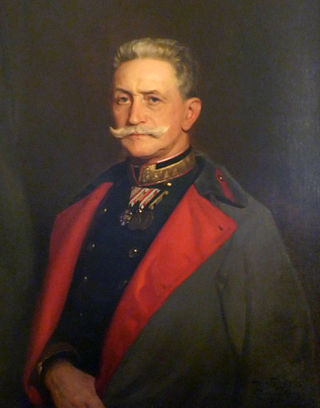
Franz Xaver Josef Conrad von Hötzendorf, sometimes anglicised as Hoetzendorf, was an Austrian general who played a central role in World War I. He served as K.u.k. Feldmarschall and Chief of the General Staff of the military of the Austro-Hungarian Army and Navy from 1906 to 1917. He was in charge during the July Crisis of 1914 that caused World War I.
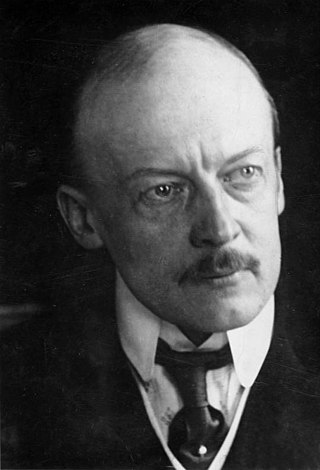
Leopold Anton Johann Sigismund Josef Korsinus Ferdinand Graf Berchtold von und zu Ungarschitz, Frättling und Püllütz was an Austro-Hungarian politician, diplomat and statesman who served as Imperial Foreign Minister at the outbreak of World War I.
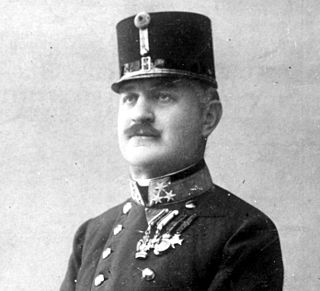
Alfred Redl was an Austro-Hungarian military officer who rose to head the Evidenzbureau, the counterintelligence wing of the General Staff of the Austro-Hungarian Army. He was one of the leading figures of pre-World War I espionage; his term in office was marked by radical innovations and the use of advanced technology to ensnare foreign spies.
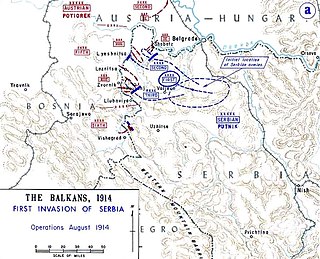
The Battle of Cer was a military campaign fought between Austria-Hungary and Serbia in August 1914, starting three weeks into the Serbian Campaign of 1914, the initial military action of the First World War. It took place around Cer Mountain and several surrounding villages, as well as the town of Šabac.

The 1st Army was a field army-level command in the ground forces of Austria-Hungary during World War I. The army fought in Galicia and Russian Poland in 1914–15 before being briefly dissolved in the summer of 1916. Shortly afterwards, it was reformed and sent to fight in the Romanian Campaign for the next two years. The 1st Army was demobilized in April 1918 due to its heavy losses, following Romania's surrender.

The powder keg of Europe or Balkan powder keg was the Balkans in the early part of the 20th century preceding World War I. There were many overlapping claims to territories and spheres of influence between the major European powers such as the Russian Empire, the Austro-Hungarian Empire, the German Empire and, to a lesser degree, the Ottoman Empire, the United Kingdom and the Kingdom of Italy.

Viktor Julius Ignaz Ferdinand Graf Dankl von Kraśnik was a highly decorated Austro-Hungarian officer who reached the pinnacle of his service during World War I with promotion to the rare rank of Colonel General (Generaloberst). His successful career met an abrupt end in 1916 due to both his performance on the Italian front and health issues. After the war, he would be a vocal apologist for both his country's war record and the dethroned Habsburg monarchy.

The Austro-Hungarian Aviation Troops or Imperial and Royal Aviation Troops were the air force of the Austro-Hungarian Empire until the empire's demise in 1918; it saw combat on both the Eastern Front and Italian Front during World War I.

The Serbian campaign was a series of military expeditions launched in 1914 and 1915 by the Central Powers against the Kingdom of Serbia during the First World War.
Konrad Grallert von Cebrów was a divisional commander in the Austro-Hungarian Army.
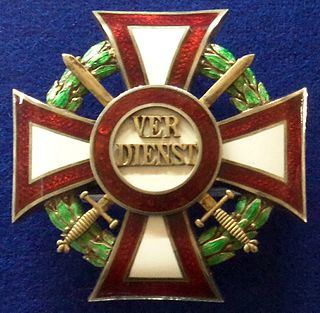
The Military Merit Cross was a decoration of the Empire of Austria and, after the establishment of the Dual Monarchy in 1867, the Empire of Austria-Hungary. It was first established on October 22, 1849 and underwent several revisions to its design and award criteria over the years of its existence. It became obsolete in 1918 with the dissolution of the Austro-Hungarian Empire.

The Military Merit Medal was a military decoration of the Empire of Austria-Hungary. It was founded by Emperor Franz Joseph I on March 12, 1890. The Military Merit Medal is often referred to as the "Signum Laudis" after the inscription on the reverse of the medal.
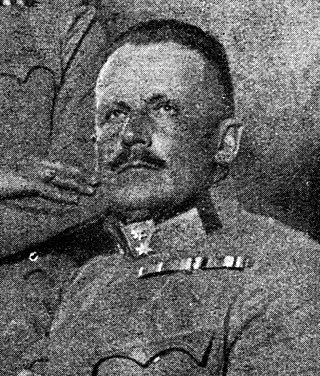
Viktor Weber Edler von Webenau, General in the Austro-Hungarian Army during World War I, military governor of Montenegro between 1916 and 1917 and head of the Austro-Hungarian armistice commission

Milan Emil Uzelac was an Austro-Hungarian military commander who was a leading figure in the air forces of the Austro-Hungarian Empire, Kingdom of Yugoslavia and the Independent State of Croatia.
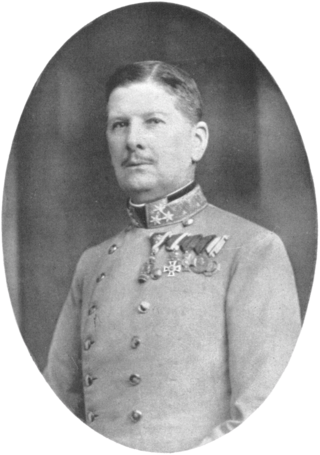
Rudolf Nikolaus Ritter von Brudermann was an Austro-Hungarian General der Kavallerie during World War I. He led Austria-Hungary's Third Army during the Battle of Galicia.

Karl Freiherr von Pflanzer-Baltin was an Austro-Hungarian general who was active in World War I.

Karl Tersztyánszky von Nádas, officially Károly Tersztyánszky, also alternatively written Tersztyánszky de Nádas was an Austro-Hungarian general who served in World War I.

Blasius von Schemua was an Austro-Hungarian general of Slovene descent.
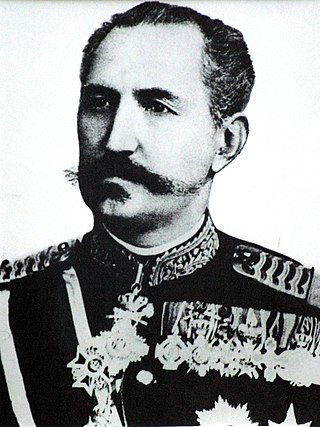
Constantin Poenaru was a Romanian general.

Juliusz Alfred Drapella was a Polish brigadier general of the Polish Armed Forces who was most notable during his service in World War II.
This page is based on this
Wikipedia article Text is available under the
CC BY-SA 4.0 license; additional terms may apply.
Images, videos and audio are available under their respective licenses.




















